Anglia Ruskin University - Global Debates: Social Media Screening
VerifiedAdded on 2023/01/11
|7
|1722
|24
Essay
AI Summary
This essay examines the contentious practice of social media screening in the hiring process. It explores the arguments for and against the use of social media profiles to evaluate job candidates. The essay delves into the potential benefits, such as identifying red flags and gaining insights into a candidate's personality and behavior, while also addressing the ethical concerns related to privacy, discrimination, and unconscious bias. The report discusses the Equality Act 2010, GDPR and the potential for employers to unintentionally discriminate against candidates. The essay draws the conclusion that organizations may carry out such screening provided that candidates themselves give the permission to screen their profiles to avoid breach of workplace ethics and invasion of privacy.
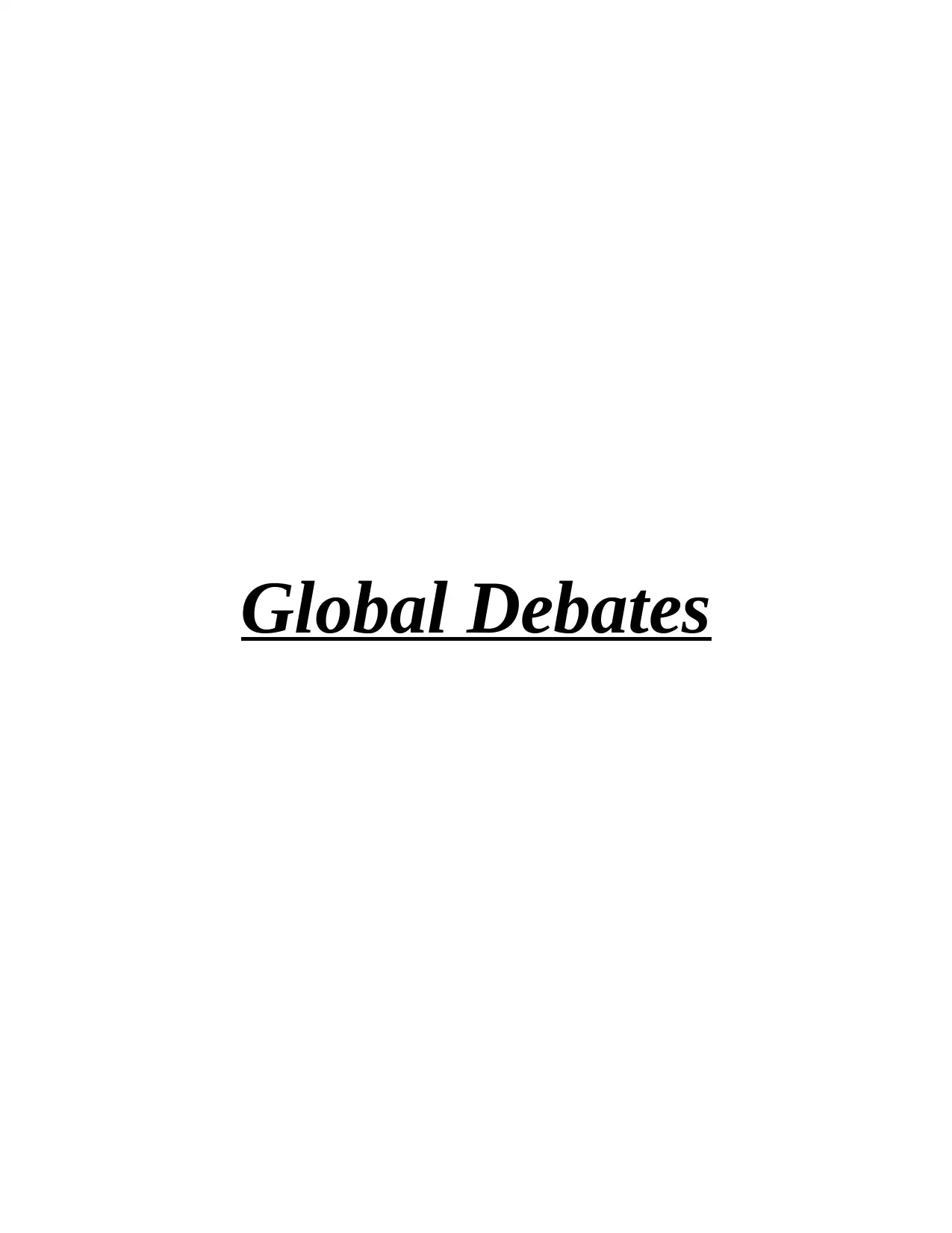
Global Debates
Paraphrase This Document
Need a fresh take? Get an instant paraphrase of this document with our AI Paraphraser
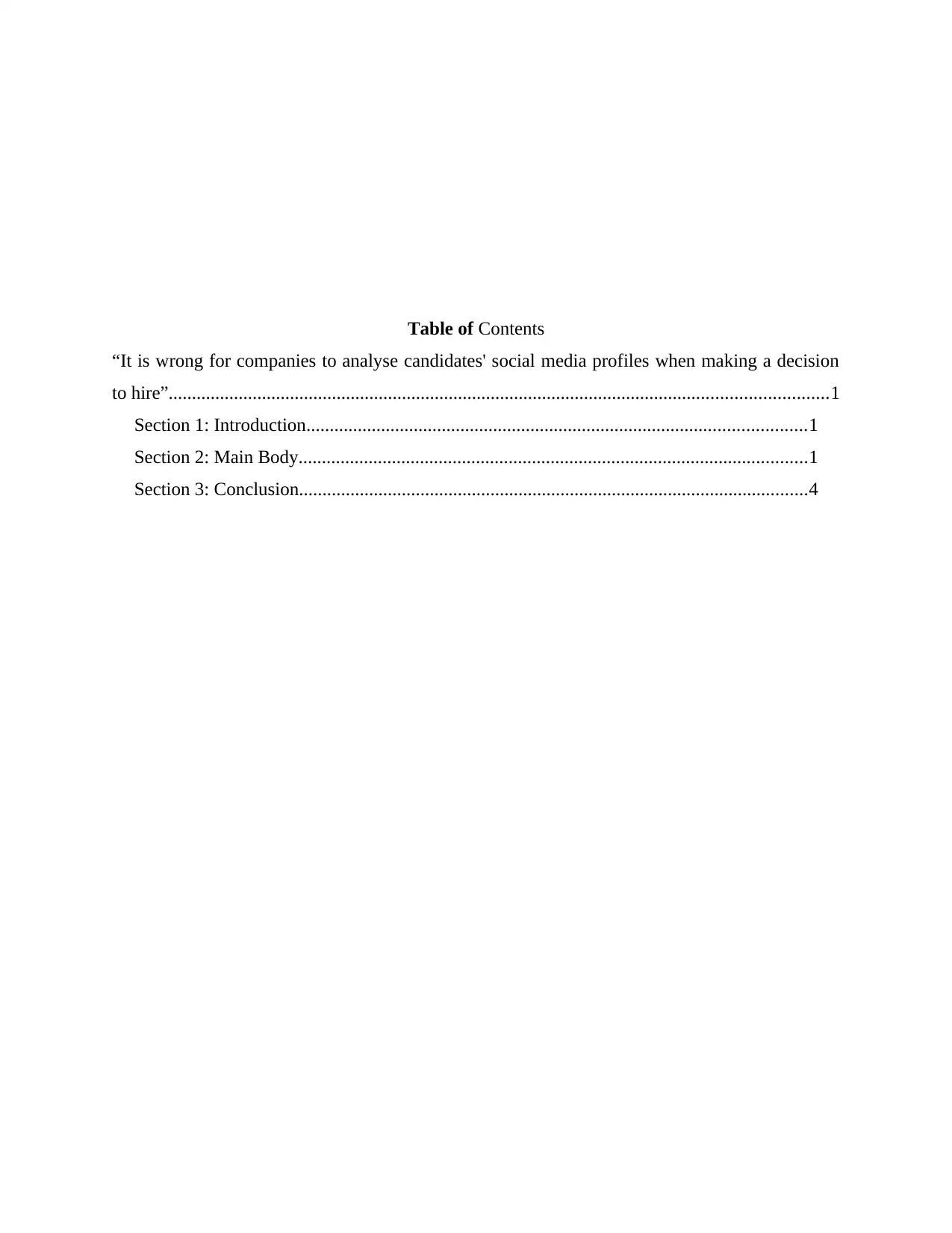
Table of Contents
“It is wrong for companies to analyse candidates' social media profiles when making a decision
to hire”.............................................................................................................................................1
Section 1: Introduction...........................................................................................................1
Section 2: Main Body.............................................................................................................1
Section 3: Conclusion.............................................................................................................4
“It is wrong for companies to analyse candidates' social media profiles when making a decision
to hire”.............................................................................................................................................1
Section 1: Introduction...........................................................................................................1
Section 2: Main Body.............................................................................................................1
Section 3: Conclusion.............................................................................................................4
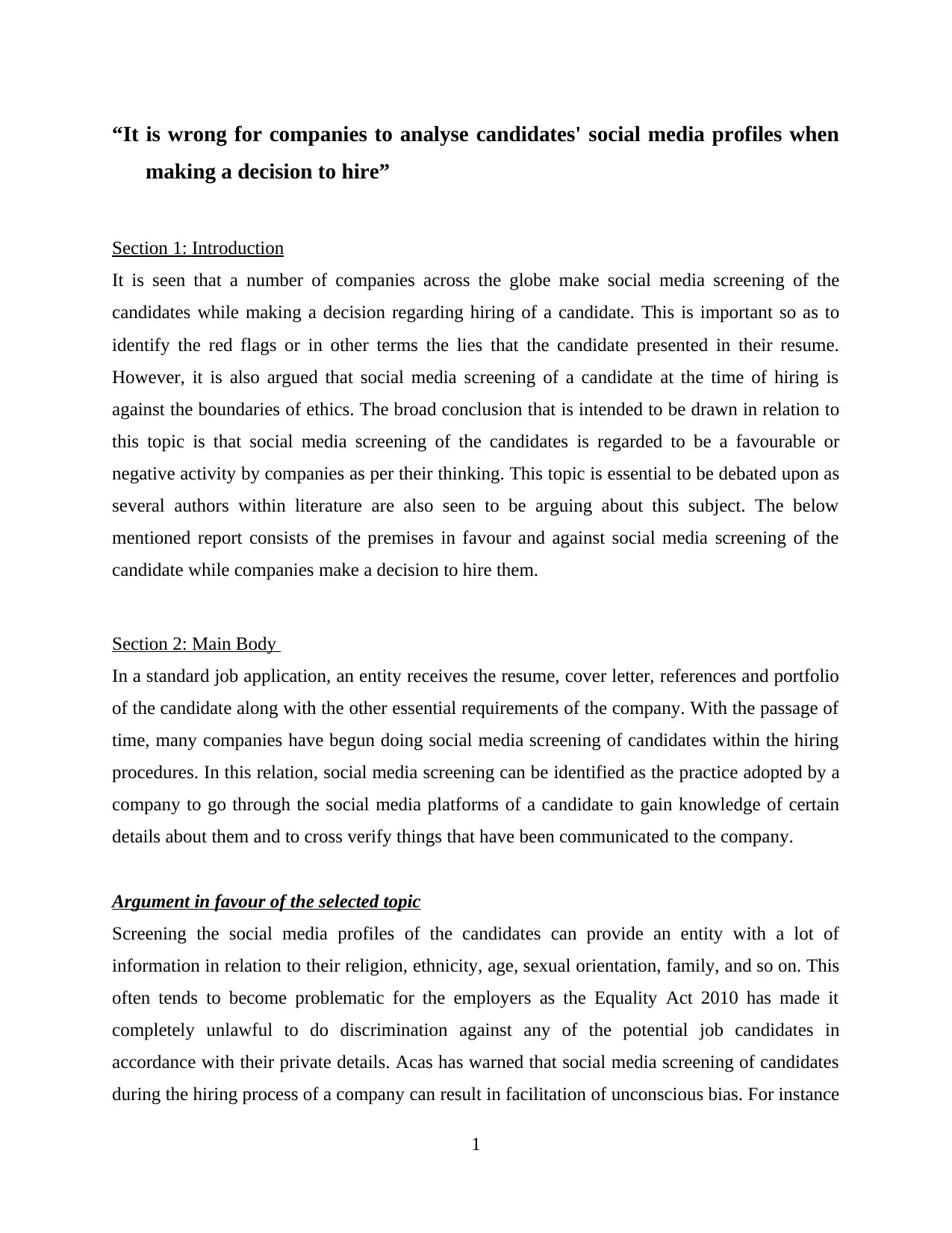
“It is wrong for companies to analyse candidates' social media profiles when
making a decision to hire”
Section 1: Introduction
It is seen that a number of companies across the globe make social media screening of the
candidates while making a decision regarding hiring of a candidate. This is important so as to
identify the red flags or in other terms the lies that the candidate presented in their resume.
However, it is also argued that social media screening of a candidate at the time of hiring is
against the boundaries of ethics. The broad conclusion that is intended to be drawn in relation to
this topic is that social media screening of the candidates is regarded to be a favourable or
negative activity by companies as per their thinking. This topic is essential to be debated upon as
several authors within literature are also seen to be arguing about this subject. The below
mentioned report consists of the premises in favour and against social media screening of the
candidate while companies make a decision to hire them.
Section 2: Main Body
In a standard job application, an entity receives the resume, cover letter, references and portfolio
of the candidate along with the other essential requirements of the company. With the passage of
time, many companies have begun doing social media screening of candidates within the hiring
procedures. In this relation, social media screening can be identified as the practice adopted by a
company to go through the social media platforms of a candidate to gain knowledge of certain
details about them and to cross verify things that have been communicated to the company.
Argument in favour of the selected topic
Screening the social media profiles of the candidates can provide an entity with a lot of
information in relation to their religion, ethnicity, age, sexual orientation, family, and so on. This
often tends to become problematic for the employers as the Equality Act 2010 has made it
completely unlawful to do discrimination against any of the potential job candidates in
accordance with their private details. Acas has warned that social media screening of candidates
during the hiring process of a company can result in facilitation of unconscious bias. For instance
1
making a decision to hire”
Section 1: Introduction
It is seen that a number of companies across the globe make social media screening of the
candidates while making a decision regarding hiring of a candidate. This is important so as to
identify the red flags or in other terms the lies that the candidate presented in their resume.
However, it is also argued that social media screening of a candidate at the time of hiring is
against the boundaries of ethics. The broad conclusion that is intended to be drawn in relation to
this topic is that social media screening of the candidates is regarded to be a favourable or
negative activity by companies as per their thinking. This topic is essential to be debated upon as
several authors within literature are also seen to be arguing about this subject. The below
mentioned report consists of the premises in favour and against social media screening of the
candidate while companies make a decision to hire them.
Section 2: Main Body
In a standard job application, an entity receives the resume, cover letter, references and portfolio
of the candidate along with the other essential requirements of the company. With the passage of
time, many companies have begun doing social media screening of candidates within the hiring
procedures. In this relation, social media screening can be identified as the practice adopted by a
company to go through the social media platforms of a candidate to gain knowledge of certain
details about them and to cross verify things that have been communicated to the company.
Argument in favour of the selected topic
Screening the social media profiles of the candidates can provide an entity with a lot of
information in relation to their religion, ethnicity, age, sexual orientation, family, and so on. This
often tends to become problematic for the employers as the Equality Act 2010 has made it
completely unlawful to do discrimination against any of the potential job candidates in
accordance with their private details. Acas has warned that social media screening of candidates
during the hiring process of a company can result in facilitation of unconscious bias. For instance
1
⊘ This is a preview!⊘
Do you want full access?
Subscribe today to unlock all pages.

Trusted by 1+ million students worldwide
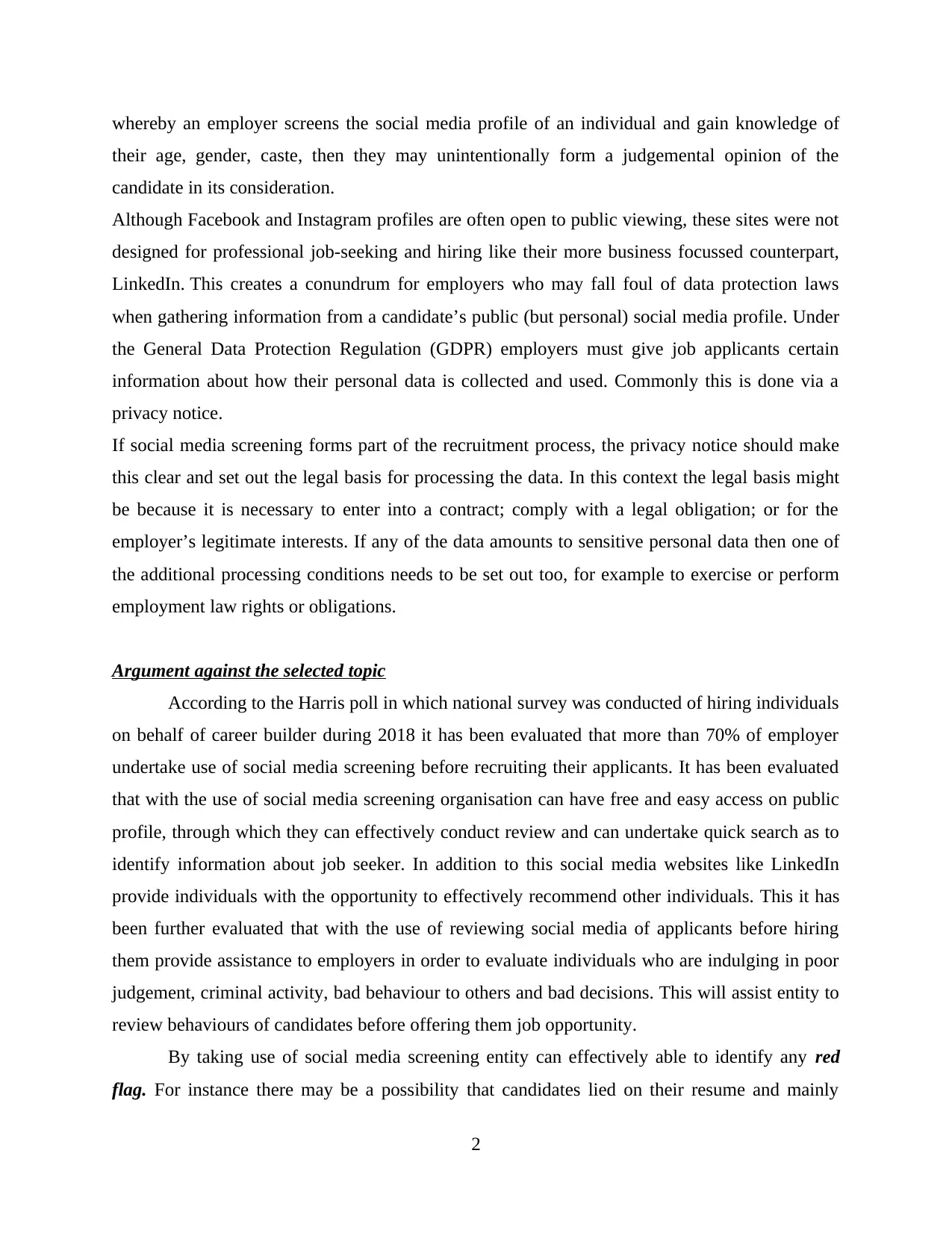
whereby an employer screens the social media profile of an individual and gain knowledge of
their age, gender, caste, then they may unintentionally form a judgemental opinion of the
candidate in its consideration.
Although Facebook and Instagram profiles are often open to public viewing, these sites were not
designed for professional job-seeking and hiring like their more business focussed counterpart,
LinkedIn. This creates a conundrum for employers who may fall foul of data protection laws
when gathering information from a candidate’s public (but personal) social media profile. Under
the General Data Protection Regulation (GDPR) employers must give job applicants certain
information about how their personal data is collected and used. Commonly this is done via a
privacy notice.
If social media screening forms part of the recruitment process, the privacy notice should make
this clear and set out the legal basis for processing the data. In this context the legal basis might
be because it is necessary to enter into a contract; comply with a legal obligation; or for the
employer’s legitimate interests. If any of the data amounts to sensitive personal data then one of
the additional processing conditions needs to be set out too, for example to exercise or perform
employment law rights or obligations.
Argument against the selected topic
According to the Harris poll in which national survey was conducted of hiring individuals
on behalf of career builder during 2018 it has been evaluated that more than 70% of employer
undertake use of social media screening before recruiting their applicants. It has been evaluated
that with the use of social media screening organisation can have free and easy access on public
profile, through which they can effectively conduct review and can undertake quick search as to
identify information about job seeker. In addition to this social media websites like LinkedIn
provide individuals with the opportunity to effectively recommend other individuals. This it has
been further evaluated that with the use of reviewing social media of applicants before hiring
them provide assistance to employers in order to evaluate individuals who are indulging in poor
judgement, criminal activity, bad behaviour to others and bad decisions. This will assist entity to
review behaviours of candidates before offering them job opportunity.
By taking use of social media screening entity can effectively able to identify any red
flag. For instance there may be a possibility that candidates lied on their resume and mainly
2
their age, gender, caste, then they may unintentionally form a judgemental opinion of the
candidate in its consideration.
Although Facebook and Instagram profiles are often open to public viewing, these sites were not
designed for professional job-seeking and hiring like their more business focussed counterpart,
LinkedIn. This creates a conundrum for employers who may fall foul of data protection laws
when gathering information from a candidate’s public (but personal) social media profile. Under
the General Data Protection Regulation (GDPR) employers must give job applicants certain
information about how their personal data is collected and used. Commonly this is done via a
privacy notice.
If social media screening forms part of the recruitment process, the privacy notice should make
this clear and set out the legal basis for processing the data. In this context the legal basis might
be because it is necessary to enter into a contract; comply with a legal obligation; or for the
employer’s legitimate interests. If any of the data amounts to sensitive personal data then one of
the additional processing conditions needs to be set out too, for example to exercise or perform
employment law rights or obligations.
Argument against the selected topic
According to the Harris poll in which national survey was conducted of hiring individuals
on behalf of career builder during 2018 it has been evaluated that more than 70% of employer
undertake use of social media screening before recruiting their applicants. It has been evaluated
that with the use of social media screening organisation can have free and easy access on public
profile, through which they can effectively conduct review and can undertake quick search as to
identify information about job seeker. In addition to this social media websites like LinkedIn
provide individuals with the opportunity to effectively recommend other individuals. This it has
been further evaluated that with the use of reviewing social media of applicants before hiring
them provide assistance to employers in order to evaluate individuals who are indulging in poor
judgement, criminal activity, bad behaviour to others and bad decisions. This will assist entity to
review behaviours of candidates before offering them job opportunity.
By taking use of social media screening entity can effectively able to identify any red
flag. For instance there may be a possibility that candidates lied on their resume and mainly
2
Paraphrase This Document
Need a fresh take? Get an instant paraphrase of this document with our AI Paraphraser
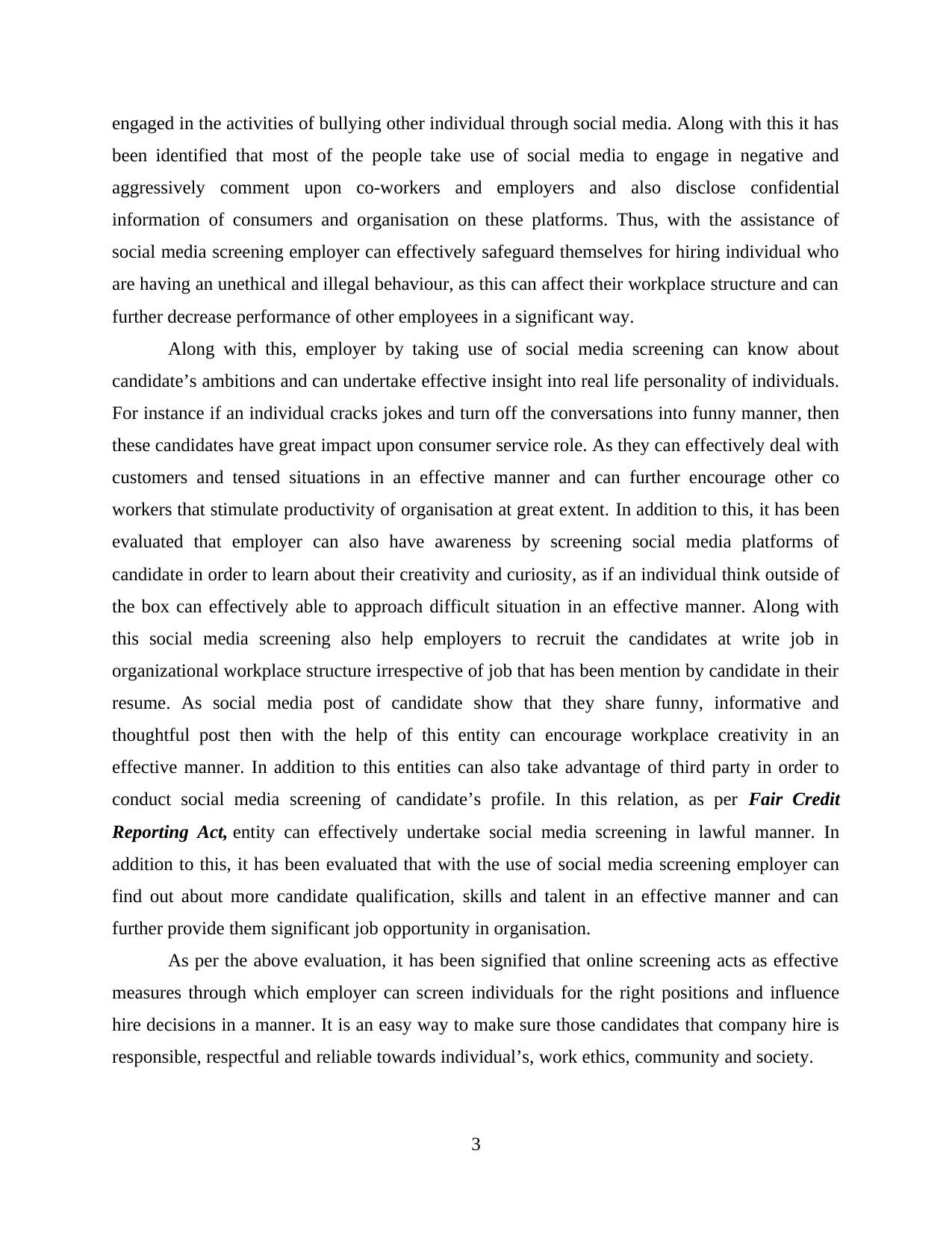
engaged in the activities of bullying other individual through social media. Along with this it has
been identified that most of the people take use of social media to engage in negative and
aggressively comment upon co-workers and employers and also disclose confidential
information of consumers and organisation on these platforms. Thus, with the assistance of
social media screening employer can effectively safeguard themselves for hiring individual who
are having an unethical and illegal behaviour, as this can affect their workplace structure and can
further decrease performance of other employees in a significant way.
Along with this, employer by taking use of social media screening can know about
candidate’s ambitions and can undertake effective insight into real life personality of individuals.
For instance if an individual cracks jokes and turn off the conversations into funny manner, then
these candidates have great impact upon consumer service role. As they can effectively deal with
customers and tensed situations in an effective manner and can further encourage other co
workers that stimulate productivity of organisation at great extent. In addition to this, it has been
evaluated that employer can also have awareness by screening social media platforms of
candidate in order to learn about their creativity and curiosity, as if an individual think outside of
the box can effectively able to approach difficult situation in an effective manner. Along with
this social media screening also help employers to recruit the candidates at write job in
organizational workplace structure irrespective of job that has been mention by candidate in their
resume. As social media post of candidate show that they share funny, informative and
thoughtful post then with the help of this entity can encourage workplace creativity in an
effective manner. In addition to this entities can also take advantage of third party in order to
conduct social media screening of candidate’s profile. In this relation, as per Fair Credit
Reporting Act, entity can effectively undertake social media screening in lawful manner. In
addition to this, it has been evaluated that with the use of social media screening employer can
find out about more candidate qualification, skills and talent in an effective manner and can
further provide them significant job opportunity in organisation.
As per the above evaluation, it has been signified that online screening acts as effective
measures through which employer can screen individuals for the right positions and influence
hire decisions in a manner. It is an easy way to make sure those candidates that company hire is
responsible, respectful and reliable towards individual’s, work ethics, community and society.
3
been identified that most of the people take use of social media to engage in negative and
aggressively comment upon co-workers and employers and also disclose confidential
information of consumers and organisation on these platforms. Thus, with the assistance of
social media screening employer can effectively safeguard themselves for hiring individual who
are having an unethical and illegal behaviour, as this can affect their workplace structure and can
further decrease performance of other employees in a significant way.
Along with this, employer by taking use of social media screening can know about
candidate’s ambitions and can undertake effective insight into real life personality of individuals.
For instance if an individual cracks jokes and turn off the conversations into funny manner, then
these candidates have great impact upon consumer service role. As they can effectively deal with
customers and tensed situations in an effective manner and can further encourage other co
workers that stimulate productivity of organisation at great extent. In addition to this, it has been
evaluated that employer can also have awareness by screening social media platforms of
candidate in order to learn about their creativity and curiosity, as if an individual think outside of
the box can effectively able to approach difficult situation in an effective manner. Along with
this social media screening also help employers to recruit the candidates at write job in
organizational workplace structure irrespective of job that has been mention by candidate in their
resume. As social media post of candidate show that they share funny, informative and
thoughtful post then with the help of this entity can encourage workplace creativity in an
effective manner. In addition to this entities can also take advantage of third party in order to
conduct social media screening of candidate’s profile. In this relation, as per Fair Credit
Reporting Act, entity can effectively undertake social media screening in lawful manner. In
addition to this, it has been evaluated that with the use of social media screening employer can
find out about more candidate qualification, skills and talent in an effective manner and can
further provide them significant job opportunity in organisation.
As per the above evaluation, it has been signified that online screening acts as effective
measures through which employer can screen individuals for the right positions and influence
hire decisions in a manner. It is an easy way to make sure those candidates that company hire is
responsible, respectful and reliable towards individual’s, work ethics, community and society.
3
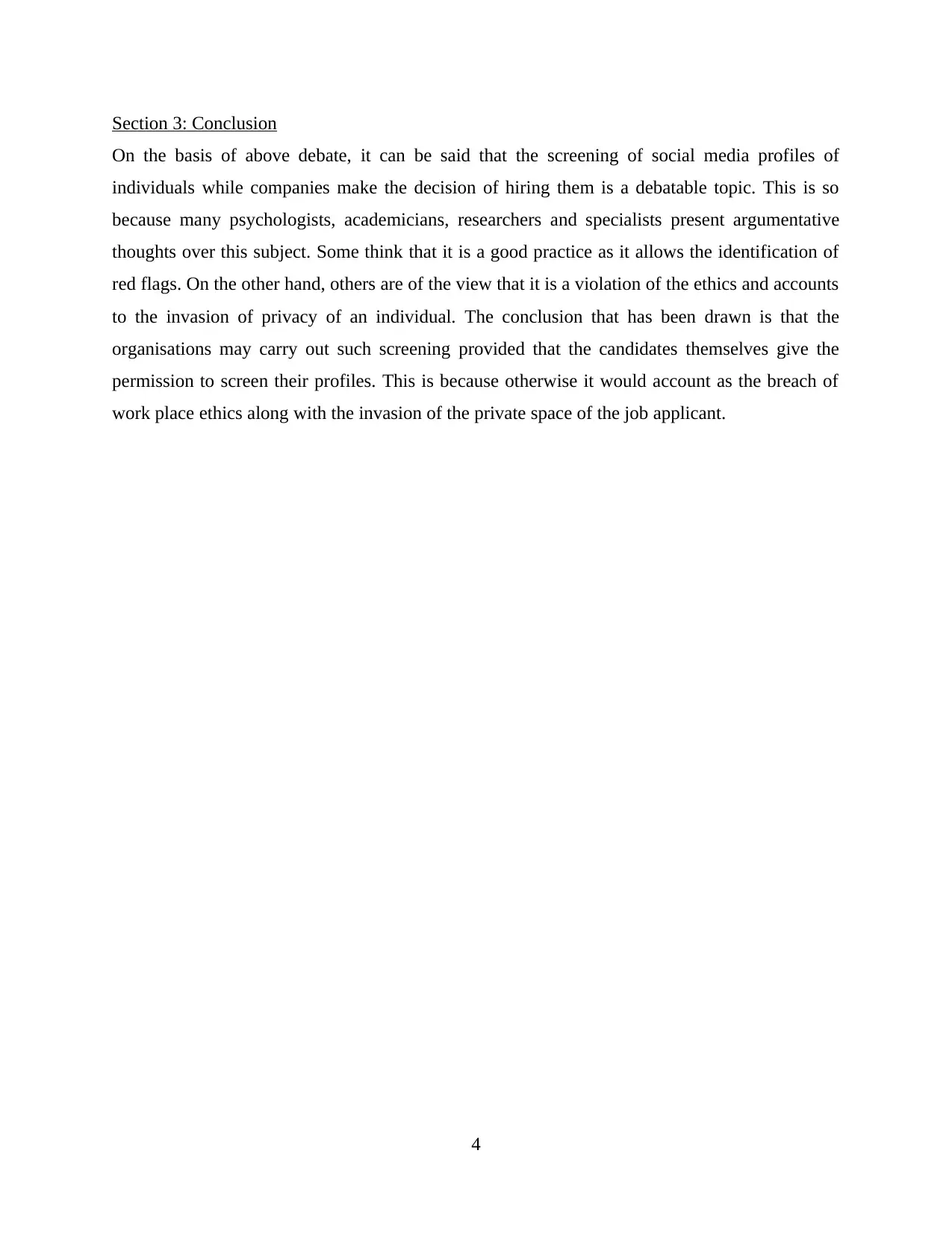
Section 3: Conclusion
On the basis of above debate, it can be said that the screening of social media profiles of
individuals while companies make the decision of hiring them is a debatable topic. This is so
because many psychologists, academicians, researchers and specialists present argumentative
thoughts over this subject. Some think that it is a good practice as it allows the identification of
red flags. On the other hand, others are of the view that it is a violation of the ethics and accounts
to the invasion of privacy of an individual. The conclusion that has been drawn is that the
organisations may carry out such screening provided that the candidates themselves give the
permission to screen their profiles. This is because otherwise it would account as the breach of
work place ethics along with the invasion of the private space of the job applicant.
4
On the basis of above debate, it can be said that the screening of social media profiles of
individuals while companies make the decision of hiring them is a debatable topic. This is so
because many psychologists, academicians, researchers and specialists present argumentative
thoughts over this subject. Some think that it is a good practice as it allows the identification of
red flags. On the other hand, others are of the view that it is a violation of the ethics and accounts
to the invasion of privacy of an individual. The conclusion that has been drawn is that the
organisations may carry out such screening provided that the candidates themselves give the
permission to screen their profiles. This is because otherwise it would account as the breach of
work place ethics along with the invasion of the private space of the job applicant.
4
⊘ This is a preview!⊘
Do you want full access?
Subscribe today to unlock all pages.

Trusted by 1+ million students worldwide
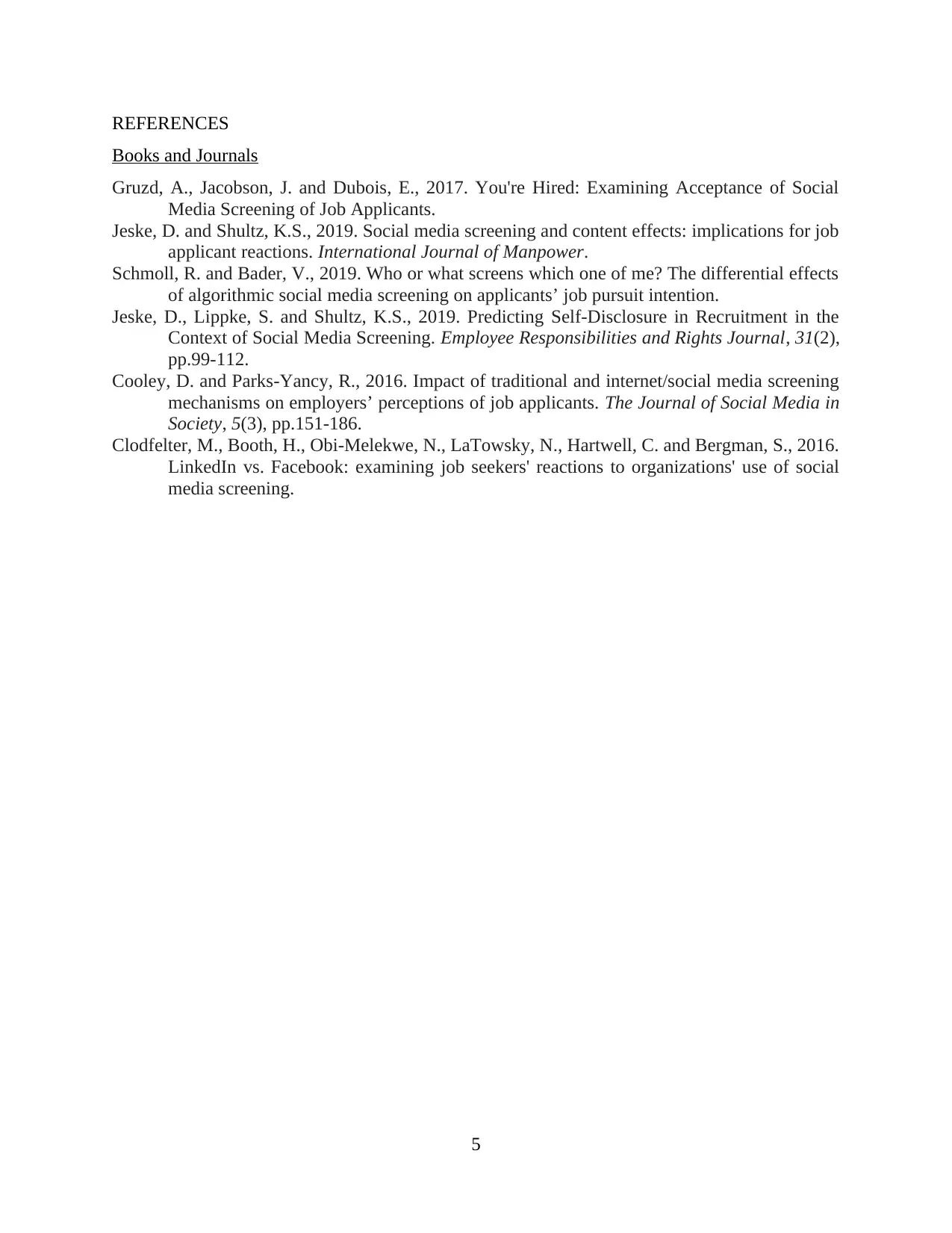
REFERENCES
Books and Journals
Gruzd, A., Jacobson, J. and Dubois, E., 2017. You're Hired: Examining Acceptance of Social
Media Screening of Job Applicants.
Jeske, D. and Shultz, K.S., 2019. Social media screening and content effects: implications for job
applicant reactions. International Journal of Manpower.
Schmoll, R. and Bader, V., 2019. Who or what screens which one of me? The differential effects
of algorithmic social media screening on applicants’ job pursuit intention.
Jeske, D., Lippke, S. and Shultz, K.S., 2019. Predicting Self-Disclosure in Recruitment in the
Context of Social Media Screening. Employee Responsibilities and Rights Journal, 31(2),
pp.99-112.
Cooley, D. and Parks-Yancy, R., 2016. Impact of traditional and internet/social media screening
mechanisms on employers’ perceptions of job applicants. The Journal of Social Media in
Society, 5(3), pp.151-186.
Clodfelter, M., Booth, H., Obi-Melekwe, N., LaTowsky, N., Hartwell, C. and Bergman, S., 2016.
LinkedIn vs. Facebook: examining job seekers' reactions to organizations' use of social
media screening.
5
Books and Journals
Gruzd, A., Jacobson, J. and Dubois, E., 2017. You're Hired: Examining Acceptance of Social
Media Screening of Job Applicants.
Jeske, D. and Shultz, K.S., 2019. Social media screening and content effects: implications for job
applicant reactions. International Journal of Manpower.
Schmoll, R. and Bader, V., 2019. Who or what screens which one of me? The differential effects
of algorithmic social media screening on applicants’ job pursuit intention.
Jeske, D., Lippke, S. and Shultz, K.S., 2019. Predicting Self-Disclosure in Recruitment in the
Context of Social Media Screening. Employee Responsibilities and Rights Journal, 31(2),
pp.99-112.
Cooley, D. and Parks-Yancy, R., 2016. Impact of traditional and internet/social media screening
mechanisms on employers’ perceptions of job applicants. The Journal of Social Media in
Society, 5(3), pp.151-186.
Clodfelter, M., Booth, H., Obi-Melekwe, N., LaTowsky, N., Hartwell, C. and Bergman, S., 2016.
LinkedIn vs. Facebook: examining job seekers' reactions to organizations' use of social
media screening.
5
1 out of 7
Related Documents
Your All-in-One AI-Powered Toolkit for Academic Success.
+13062052269
info@desklib.com
Available 24*7 on WhatsApp / Email
![[object Object]](/_next/static/media/star-bottom.7253800d.svg)
Unlock your academic potential
Copyright © 2020–2026 A2Z Services. All Rights Reserved. Developed and managed by ZUCOL.





